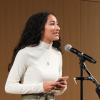While April may be the cruelest month , it’s an exciting time for poetry.
From Jamaica Plain to Cambridge, the Boston area is flush with open mics and poetry slams — and over the last few years, it seems like poetry has been winning the hearts and minds of young and old alike.
A study found the amount of young people reading poetry almost doubled from 2012-2017, traffic to sites such as Poets.org surged 25% during the beginning of the pandemic, and hundreds of new independent bookstores have opened across the country in recent years. Poets like Rupi Kaur have over four and a half million followers on Instagram, and there have been moments where poetry has exploded in pop culture, including when Amanda Gorman read her poem, “ The Hill We Climb ” at President Biden’s inauguration.
"The music of poetry is back. And the performance aspects of poetry are back. And the public aspects of poetry are back," says Elisa New, professor of American Literature at Harvard University. "I think those three things, together, really encapsulate why there's this renewed enthusiasm and excitement about poetry. It's been lifted off the page and out of solitary experience and brought back into the body and back into public."
In Cambridge, poetry has been lifted off the page and stamped directly into the ground. Since 2015, the annual Cambridge Sidewalk Poetry Contest has been soliciting poems from residents and choosing five winners — the victorious poems are stamped into fresh concrete throughout the city. This year 336 poems were submitted, although not all the submissions met the guidelines . That's an increase from the 252 submitted last year. The contest was paused in 2021 due to the pandemic.
When asked what she hopes happens when someone stumbles across a poem on the sidewalk, Lillian Hsu, director of Public Art for Cambridge Arts, said: "That they pause. Maybe wonder. Read it. Share it. Keep in mind that location in front of that school or library, there's a poem there. And come back again because many people are walking the same route every day. I think the sidewalk is not just a surface, but it's a whole space... it's a social space, an economic space, a cultural space, and so I think the impact is across time."
Greater Boston has a long history when it comes to poetry. Almost 400 years ago, one of the most important early American poets, Anne Bradstreet, was writing poems in Cambridge (known as Newtown at the time). In the 1700s, one of the " best known poets " in America was Phyllis Wheatley, an enslaved woman who spent much of her life in Boston.
"It's disheartening to be able to read somebody's work from 1630's or 1920s and look back from 2023 and say, 'Wow, we've come a long way, but we still have a long way to go,' especially when I'm talking about my experience as a Black, queer woman in the United States," said Amanda Shea, Boston-based poet and artist. "So, I feel like, gentrification, trauma, discrimination, racism, all of those things still exist today, so it's very important for me to keep telling those stories. But also uplift the progression we have made."
GUESTS
Amanda Shea, Boston-based multidisciplinary artist, educator and publicist
Lillian Hsu, director of Public Art at Cambridge Arts
Elisa New, Powell M. Cabot professor of American Literature at Harvard University, director and host of PBS's Poetry in America, and director of the Center for Public Humanities at Arizona State University








